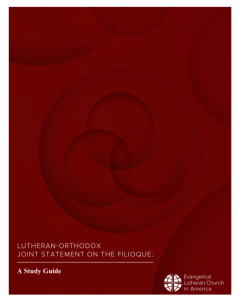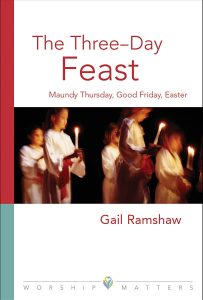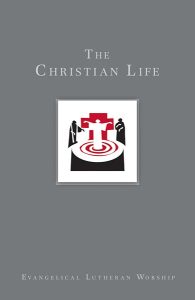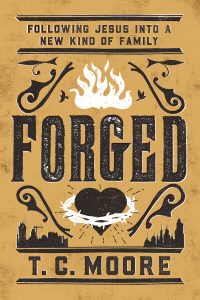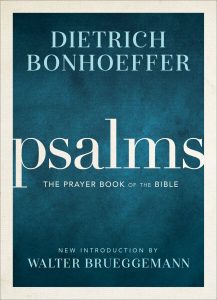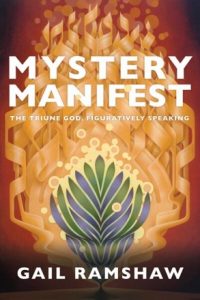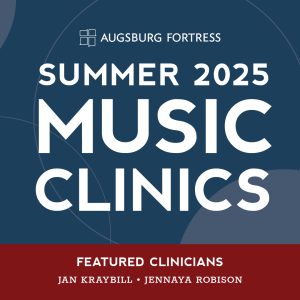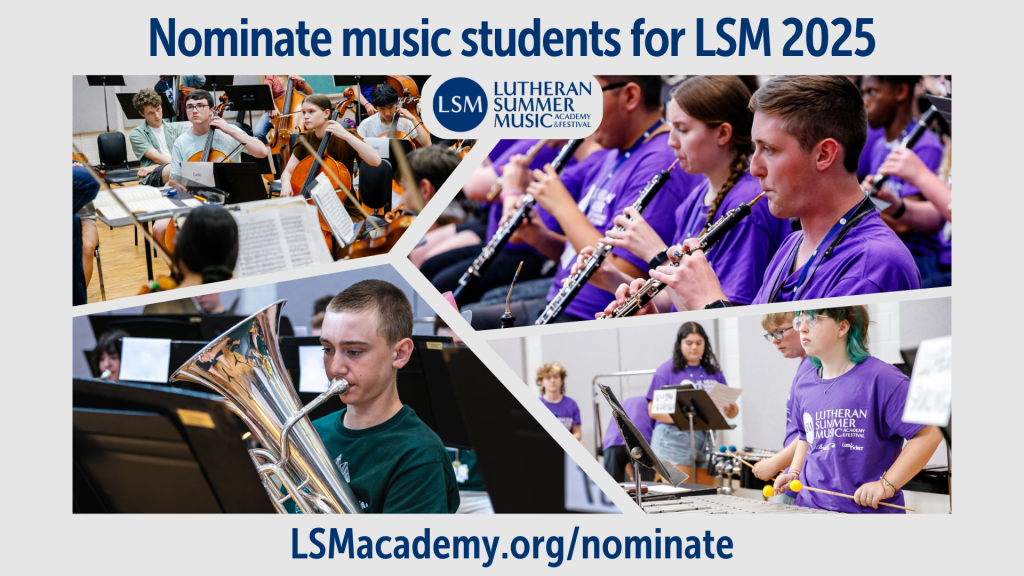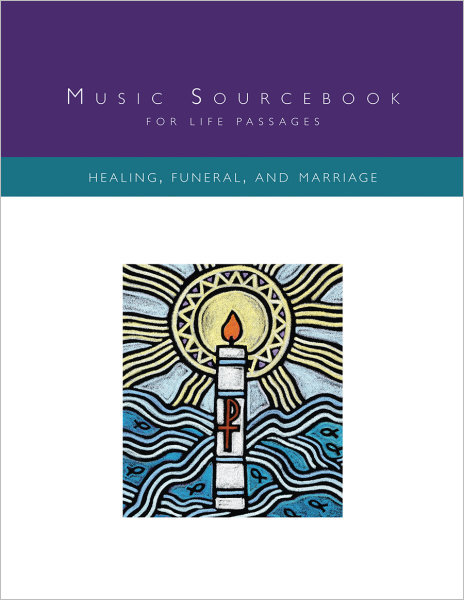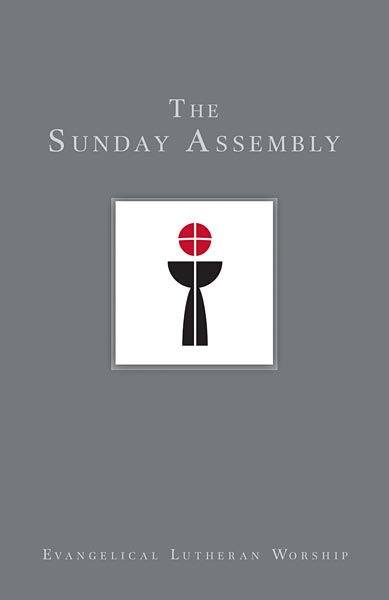Each month ELCA Worship highlights resources and events from other organizations and institutions. These Lutheran and ecumenical partner organizations work alongside the ELCA to support worship leaders, worship planners, musicians, and all who care about the worship of the church.
Rooted in Christian contemplative and activist traditions, Music That Makes Community envisions a liberative culture that empowers individuals and communities to claim and use the power of singing to heal our spirits, nurture our common lives, and work for justice. We offer resources, training, and encouragement to individuals, organizations, and communities in the dynamic power of singing to connect others and ourselves.
Training Events — Join us for the following events for continuing education, community building, professional development, and celebrating this practice of paperless communal song-sharing.
More in-person events near Kansas City, Detroit, Lexington, Ky., Raleigh, N.C., and Atlanta. Please stay tuned!
Monday Morning Grounding — This weekly online touchstone continues to offer song, silence, sacred text and community connection, Mondays at 10 a.m. Eastern / 7 a.m. Pacific until April 7. Register for the Zoom link here.
Resources – Read the MMC blog for articles about …
There are also new Job Postings (including one ELCA) on our website.
Please join our monthly newsletter for regular updates and we’ll see you at an event soon!
An ecumenical conference on liturgical renewal for the church today.
Rites of Passage: Engaging Occasional Practitioners in a Secular Age
Valparaiso, Ind.
April 28–30, 2025
Registration is open now!
The American religious landscape is characterized by declining participation in religious institutions, increasing uncertainty about matters of faith, and a growing population identifying as non-religious. Nevertheless, many people continue to turn to churches at some of the most significant moments in their lives—such as the birth of a child or the loss of a loved one—and many others show up to support them.
Most of our planning resources are directed at the Sunday assembly. Yet, baptisms, weddings, and funerals are liturgical events rich in their potential for service and outreach. How might we more fully consider the possibilities of these occasions to be better prepared to serve a decreasingly churched culture?
Sign up for our monthly newsletter to stay up to date on the 2025 conference.
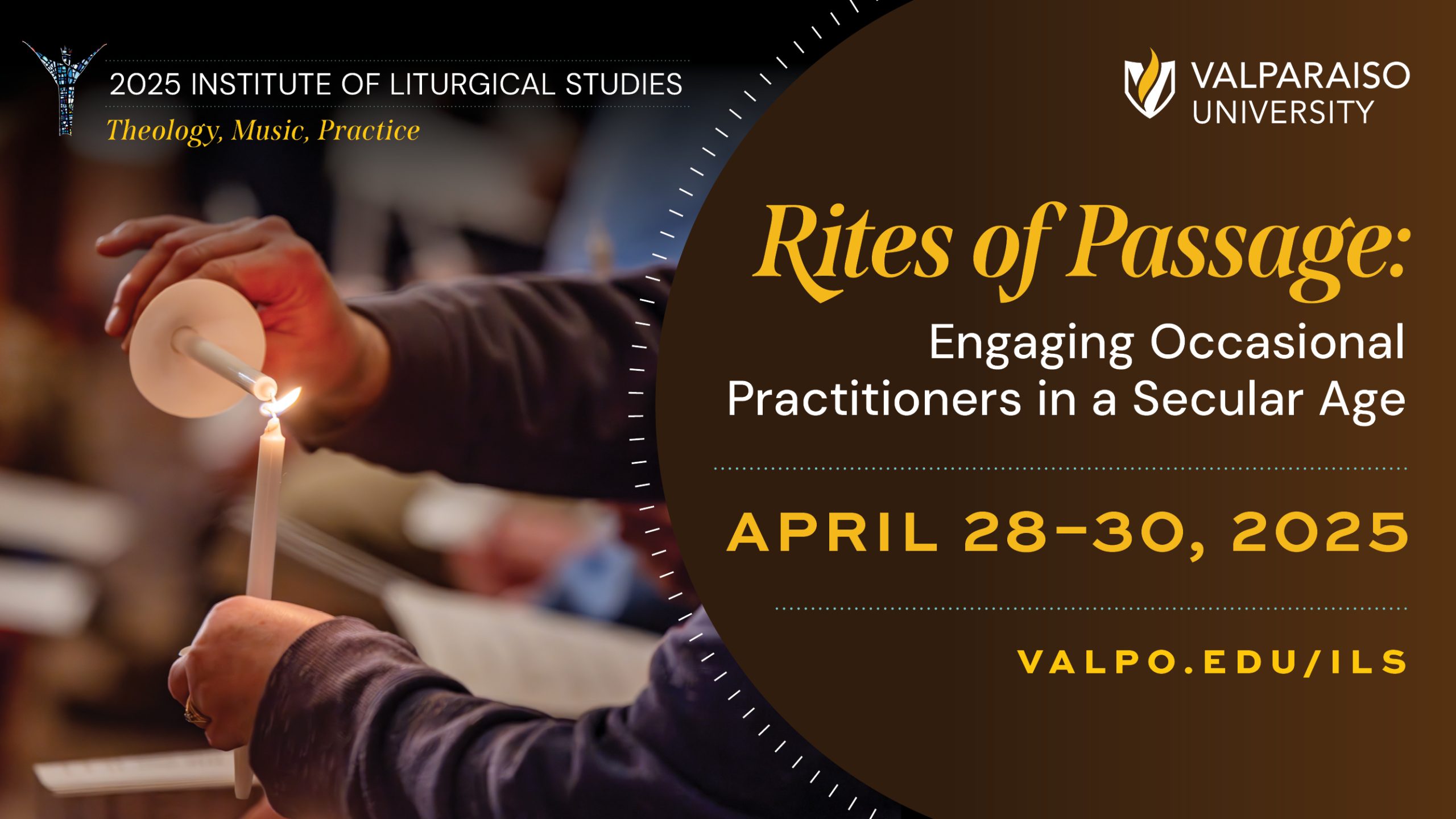
Transforming and connecting lives through faith and music since 1981.
Youth musicians from across the country are headed to Valparaiso University this year for the 2025 Lutheran Summer Music Academy & Festival (LSM). Students in grades 8-12 will be immersed in a supportive community that nurtures their musical growth, and invites them to share their musical gifts in performance and in worship. With the Standard Enrollment deadline approaching on March 1, now is the perfect time to nominate students so their families can directly receive information and an invitation to apply. Do you know young musicians who would thrive at LSM? Nominate them today at LSMacademy.org/nominate.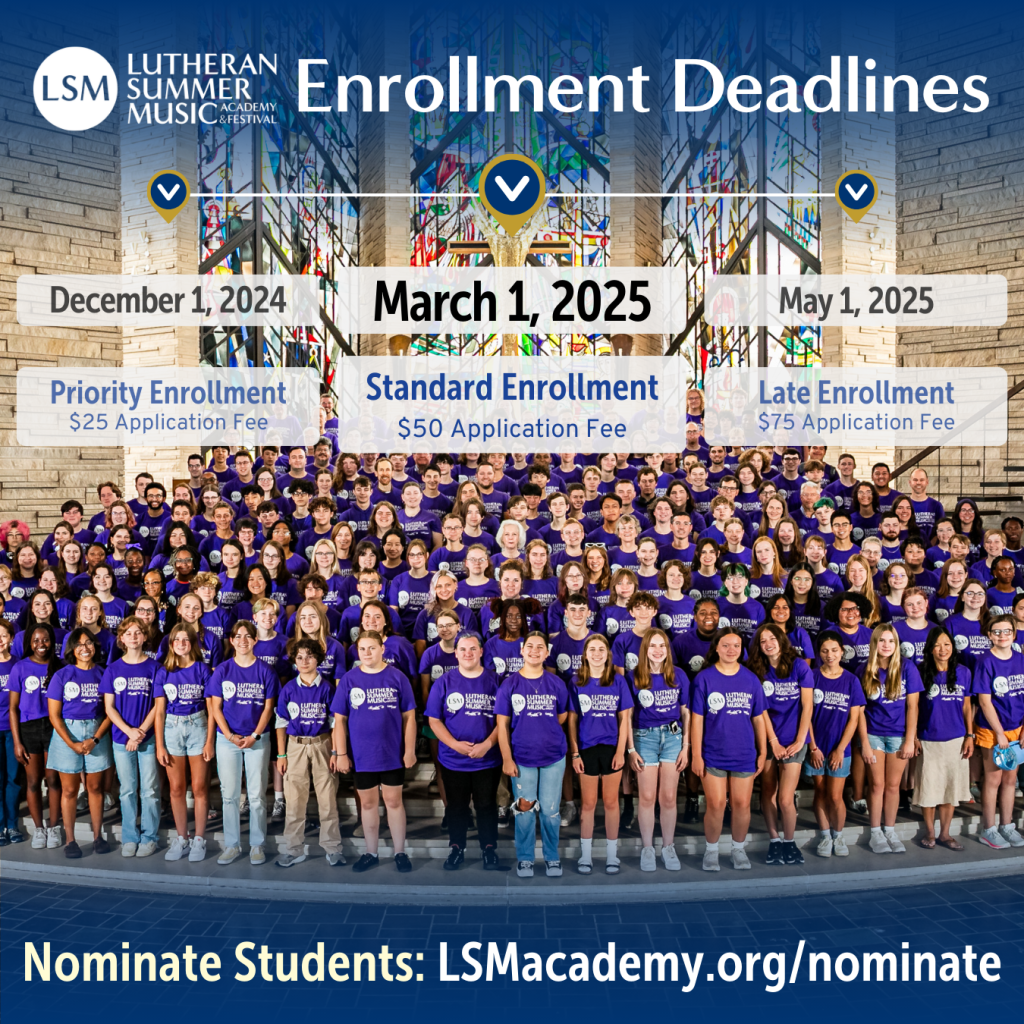
ALCM nurtures and equips musicians to serve and lead the church’s song.
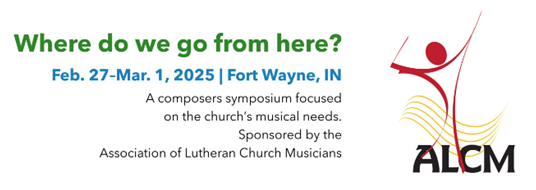
ALCM is excited to offer a composers symposium, Where Do We Go from Here, to stimulate conversation among composers regarding our efforts to be faithful, creative, and nurturing stewards of the church’s song – even where gatherings have limited human and material resources. Registrants will also have the opportunity to explore newer music software. For a more detailed look, visit the symposium website. More information is added regularly, so check back often for more.
ALCM is especially grateful to the hosts for this symposium, Bob Hobby and Trinity English Lutheran Church. Generous donations from the Fred Jackisch Memorial Fund as well as from Trinity English Lutheran have helped to maximize the benefits of attendance while minimizing costs to registrants. Registration rates go up after January 14th. Those who register for both the 2025 Symposium and Raleigh-Durham Conference will receive a $70 dollar refund at the close of the conference.
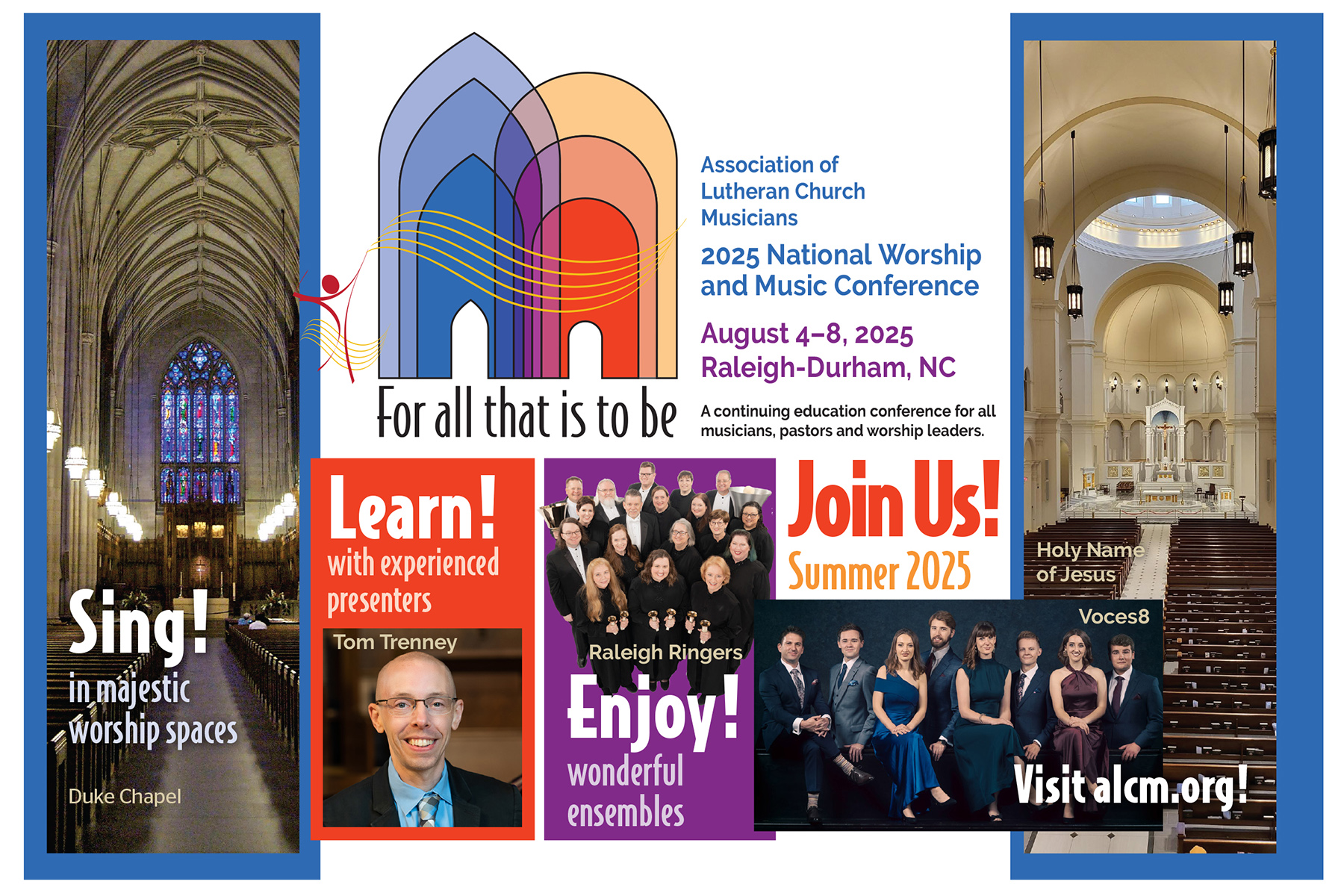
ALCM Conference 2025
Aug. 4-8
Raleigh-Durham, N.C.
The conference theme, For all that is to be, describes our effort to equip people in all stages of their love for music of the church. Whether you are a volunteer, part-time or full-time employed, a student, newly employed, or retired, this conference will nurture your passion for the many ways in which we continue to share the gospel message.
Now is a great time to register and get the best rate. If you get continuing education funds, maybe you have some money left in your budget this year that you can put toward this opportunity. Registration is live – visit the conference website to register now. We look forward to seeing you in Raleigh!
The Center for Church Music is a place where one can tap into an expansive library of resources and perspectives on the music and art of the church, with a focus on a Lutheran context.
“Profiles in American Lutheran Church Music” presents video conversations with prominent church musicians “Beyond the Children’s Choir: Focused Experiences for Children in Worship: Emily Woock, Elmhurst Ill., Oct. 2023 and the Rev Paul D. Weber, (interviewed by Barry Bobb, April 2024) as well as many other Lutheran Church musicians.

The mission of The Hymn Society in the United States and Canada is to encourage, promote, and enliven congregational singing. The Center for Congregational Song is the resource and programmatic arm of The Hymn Society, connecting resources, leading deep and vital conversations about the church’s song, and collaborating with our partners.
Back in 2020, The Center for Congregational Song hosted a 12-hour broadcast of music and pastoral moments on Election Day in an effort to provide a space for peace in a time of great anxiety. Four years later, the political discourse in the United States is not all that different, and, in some ways, even more charged than it was before. If you find yourself in need of a break from the news, we invite you to recharge by watching our broadcast from four years ago.

An ecumenical community seeks to support seekers and those who accompany them. The process is an enlivened journey of spiritual formation for those either exploring Christianity or seeking to renew their faith.
The board of Journey to Baptismal Living, formerly North American Association for the Catechumenate, has been very busy, during and since the pandemic, working on producing updated catechetical and liturgical resources as well as updating our website.
Now we would like to connect with parishes interested in the catechumenal process. If you already have a process, we would like to discuss our new resources and also learn from you about your experiences. If you are interested but not active, we are available to do online training. Our new website can provide you with information about who we are and what we do. Or contact us for further information.

Augsburg Fortress is the publishing ministry of the Evangelical Lutheran Church in America
Life Renewed: Devotions for Lent 2025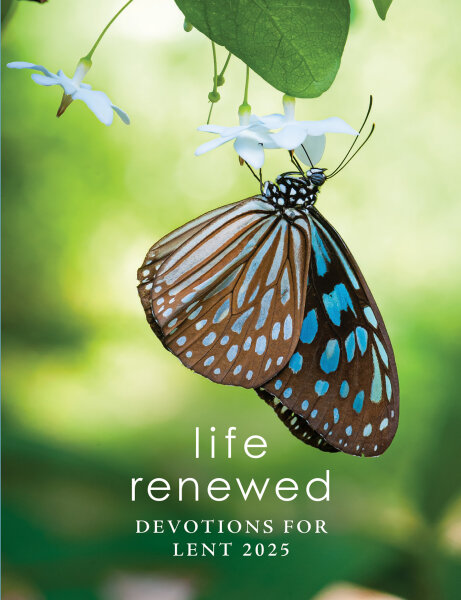
God brings new life in unexpected ways and in the most unlikely situations. This devotional reflects on how God does this in the creation of all things, the Israelites’ rescue from slavery in Egypt, the dry bones and Ezekiel, the fiery furnace, the big fish and Jonah, and more. Life Renewed provides devotions for each day from Ash Wednesday to the Resurrection of Our Lord/Vigil of Easter (March 5 to April 19). The devotions begin with evocative images and brief scripture readings drawn from traditional Easter Vigil texts. The writers then bring their diverse voices and pastoral wisdom to the texts with quotations to ponder, reflections, and prayers. Check out the promo pack linked at the bottom of the webstore page for free resources including posters, bulletin inserts, Wednesday worships, a hymn and anthems list, bookmarks with children’s activities, and more! Available in pocket size, large print, and e-book formats, with quantity discounts available.
Preparing the Assembly’s Worship: A Handbook for Worship Planning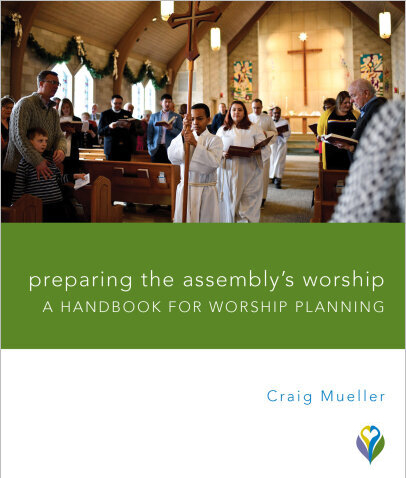
Just published! This Worship Matters handbook by Rev. Craig Mueller offers helpful guidance for preparing worship in your congregation, whether that preparation is done by a large worship committee, a small staff, or a group of volunteers. As worship leaders look ahead to worship next week or next year, Preparing the Assembly’s Worship offers practical ideas and handy checklists, as well as questions for deeper reflection.
In These or Similar Words: Crafting Language for Worship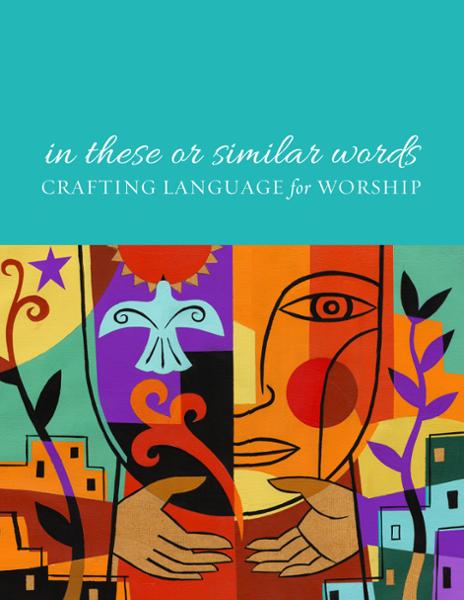 , (for any congregation or leadership that wants to do more writing/customization of their local worship)
, (for any congregation or leadership that wants to do more writing/customization of their local worship)
In These or Similar Words: Crafting Language for Worship will guide individuals and groups who wish to prepare new worship texts for their communities. The resource includes: some discussion of foundational principles for evaluating sources of language and images used in such texts; individual and group exercises to identify and describe your local worshiping community’s makeup, values, and sensibilities; brief commentaries about “what’s going on” in specific liturgical texts within the services of Holy Communion and Holy Baptism in Evangelical Lutheran Worship; examples of locally crafted language for worship for illustration and inspiration; and, reproducible pages with practical tips and helps for the actual process of writing new texts.
Go Make Disciples: An Invitation to Baptismal Living 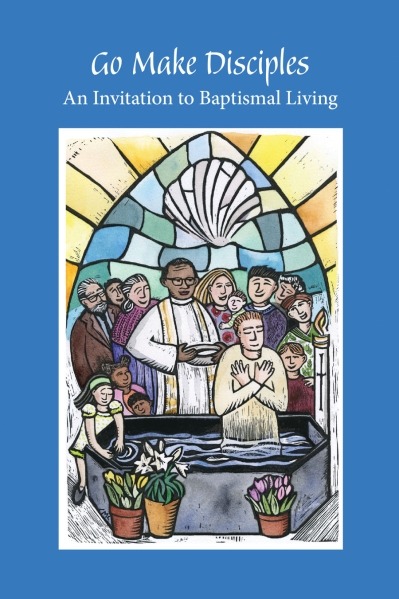 (catechumenate how-to for congregations)
(catechumenate how-to for congregations)
This highly-informative handbook is intended to help congregations implement the task of making disciples in their own community. Go Make Disciples provides updated resources for preparing adults for baptism or affirmation of baptism, and for Christian discipleship. Appropriate for a wide range of Protestant denominations, especially Lutheran, Episcopal, Anglican, United Methodist, Presbyterian, and Reformed traditions. Materials intended for group use and distribution are available on the companion CD-ROM, which is sold separately.
 Using Evangelical Lutheran Worship, Vol 3: Keeping Time
Using Evangelical Lutheran Worship, Vol 3: Keeping Time  Lutheran Study Bible, Second Edition (NRSVue)
Lutheran Study Bible, Second Edition (NRSVue) Sundays and Seasons: Guide to Worship Planning Year A
Sundays and Seasons: Guide to Worship Planning Year A


